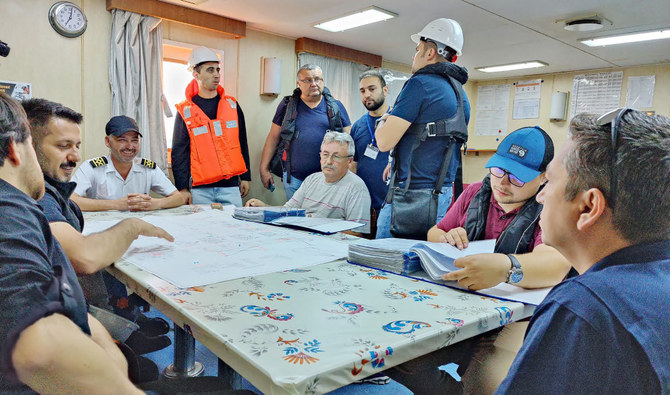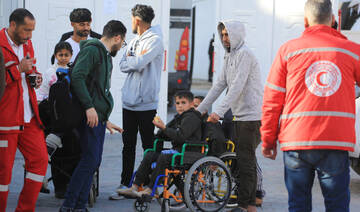BEIRUT: A ship bringing corn to Lebanon’s northern port of Tripoli normally would not cause a stir. But it’s getting attention because of where it came from: Ukraine’s Black Sea port of Odesa.
The Razoni, loaded with more than 26,000 tons of corn for chicken feed, is emerging from the edges of a Russian war that has threatened food supplies in countries like Lebanon, which has the world’s highest rate of food inflation — a staggering 122 percent — and depends on the Black Sea region for nearly all of its wheat.
The fighting has trapped 20 million tons of grains inside Ukraine, and the Razoni’s departure on Monday marked a first major step toward extracting those food supplies and getting them to farms and bakeries to feed millions of people who are going hungry in Africa, the Middle East and parts of Asia.
“Actually seeing the shipment move is a big deal,” said Jonathan Haines, senior analyst at data and analytics firm Gro Intelligence.
“This 26,000 tons in the scale of the 20 million tons that are locked up is nothing, absolutely nothing ... but if we start seeing this, every shipment that goes is going to increase confidence.”
The small scale means the initial shipments leaving the world’s breadbasket will not draw down food prices or ease a global food crisis anytime soon. Plus, most of the trapped grain is for animal feed, not for people to eat, experts say.
I think the crisis will continue as long as operating costs continue to soar and purchasing power falls.
Ibrahim Tarchichi, Chief of the Bekaa Farmers Association
That will extend the war’s ripple effects for the world’s most vulnerable people thousands of miles away in countries like Somalia and Afghanistan, where hunger could soon turn to famine and where inflation has pushed the cost of food and energy out of reach for many.
To farmers in Lebanon, the shipment expected this weekend is a sign that grains might become more available again, even if at a higher price, said Ibrahim Tarchichi, head of the Bekaa Farmers Association.
But he said it won’t make a dent in his country, where years of endemic corruption and political divides have upended life.
Since 2019, the economy has contracted by at least 58 percent, with the currency depreciating so severely that half the population now lives in poverty.
“I think the crisis will continue as long as operating costs continue to soar and purchasing power falls,” Tarchichi said.
The strife was on sharp display this week when a section of Beirut’s massive port grain silos collapsed in a huge cloud of dust, two years after a massive explosion killed more than 200 people and wounded thousands of others.
While symbolic, the shipments have done little to cool market concerns. Drought and high fertilizer costs have kept grain prices more than 50 percent higher than early 2020, before the COVID-19 pandemic. And while Ukraine is a top supplier of wheat, barley, corn and sunflower oil to developing countries, it represents just 10 percent of the international wheat trade.
There’s also little to suggest that the world’s poorest who rely on Ukrainian wheat distributed through UN agencies like the World Food Programme will be able to access them anytime soon.
Before the war, half the grain the World Food Programme purchased for distribution came from Ukraine.
The Razoni’s safe passage was guaranteed by a four-month-long deal brokered by the UN and Turkey with Ukraine and Russia two weeks ago.
The grain corridor through the Black Sea is 111 nautical miles long and 3 nautical miles wide, with waters strewn with drifting explosive mines, slowing the work.
Three more ships departed on Friday, heading to Turkey, Ireland and the United Kingdom. All the ships that have departed so far had been stuck there since the war began nearly six months ago.
Under the deal, some — not all — the food exported will go to countries experiencing food insecurity. That means it could take weeks for people in Africa to see grain from the new shipments and even longer to see the effects on high food prices, said Shaun Ferris, a Kenya-based adviser on agriculture and markets for Catholic Relief Services, a partner in World Food Programme distributions.
In East Africa, thousands of people have died as Somalia and neighboring Ethiopia and Kenya face the worst drought in four decades. Survivors have described burying their children as they fled to camps where little assistance could be found.
After Russia invaded Ukraine, Somalia and other African countries turned to non-traditional grain partners like India, Turkey and Brazil, but at higher prices. Prices of critical foods could start to go down in two or three months as markets for imported food adjust and local harvests progress, Ferris said.
Deciding who is first in line for the grain from Ukraine could be affected by humanitarian needs but could also come down to existing business arrangements and commercial interests, including who is willing to pay the most, Ferris said.
“Ukraine is not a charity,” he said. “It will be looking to get the best deals on the market” to maintain its own fragile economy.
The WFP said this week it’s planning to buy, load and ship 30,000 tons of wheat out of Ukraine on a UN-chartered vessel. It did not say where the vessel would go or when that voyage might happen.
In Lebanon, where Mercy Corps says the price of wheat flour has risen by more than 200 percent since the start of Russia’s war, people stood in long, often tense lines outside bakeries for subsidized bread in recent days.
The government green-lit a $150 million World Bank loan to import wheat, a temporary solution of six to nine months before it could be forced to lift subsidies on bread altogether.
While the situation is hard for millions of Lebanese, the country’s roughly 1 million Syrian refugees who fled a civil war across the border face stigmatization and discrimination trying to buy bread.
A Syrian living in northern Lebanon said it often takes him three to four visits to bakeries before he finds someone willing to sell him bread, with priority given to Lebanese. He described lines of 100 people waiting and only a handful being allowed in every half-hour to buy a small bundle of loaves.
“We get all sorts of rude comments because we’re Syrian, which we usually just ignore, but sometimes it gets too much and we decide to go home empty-handed,” he said, speaking on condition of anonymity for fear of reprisal.
















